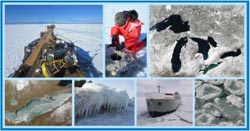Deep Freeze in the Great Lakes

NOAA Great Lakes Environmental Research Lab<br><br>A collage of icy Great Lakes conditions.<br>
Lake Superior is more than 90 percent iced over, and experts say there's a possibility it will be covered completely before winter's end for the first time in nearly 20 years. Someone has proposed a hike across Lake Michigan, and Lake Huron and Lake Erie are 95 percent frozen.
But even without 100 percent ice cover, the icy lakes are having a major effect on the environment around them.
“The biggest impact we'll see is shutting down the lake effect snow,” said Guy Meadows, director of Michigan Technological University's Great Lakes Research Center in Houghton, on Michigan’s snowy Upper Peninsula. Lake effect snow occurs when weather systems from the north and west pick up evaporating lake water that's warmer than the air, then drop it as snow after reaching land, he explained. An ice cover prevents that evaporation.
Ice on the Great Lakes can also contribute to more frigid temperatures, Meadows noted, because the warmer lake water won't have the chance to moderate the temperatures of those same northerly weather systems the way it usually does.
if there the weather is cold and calm, the ice can grow fairly quickly, because the water temperature is near the freezing point. However, strong winds can break up ice that's already formed, pushing it into open water and piling it vertically both above and below the water line.
The Soo Locks are currently closed for the winter, and all shipping on Lake Superior has halted, but ice buildups can cause problems in the spring. Even icebreaker ships can't do much about ice buildup that can be as much as 25 or 30 feet deep.
The ice can also have positive effects though. Lake Superior's whitefish and some other fish, for example, need ice cover to protect their spawning beds from winter storms. Heavy ice, therefore, should lead to good fishing.
Meadows said invasive nuisance species have been thriving at the bottom of Lake Superior in recent years largely because of warmer temperatures, so “cooling things back down will be a good thing in that sense.”
Media Contact
More Information:
http://www.mtu.eduAll latest news from the category: Earth Sciences
Earth Sciences (also referred to as Geosciences), which deals with basic issues surrounding our planet, plays a vital role in the area of energy and raw materials supply.
Earth Sciences comprises subjects such as geology, geography, geological informatics, paleontology, mineralogy, petrography, crystallography, geophysics, geodesy, glaciology, cartography, photogrammetry, meteorology and seismology, early-warning systems, earthquake research and polar research.
Newest articles

Red light therapy for repairing spinal cord injury passes milestone
Patients with spinal cord injury (SCI) could benefit from a future treatment to repair nerve connections using red and near-infrared light. The method, invented by scientists at the University of…

Insect research is revolutionized by technology
New technologies can revolutionise insect research and environmental monitoring. By using DNA, images, sounds and flight patterns analysed by AI, it’s possible to gain new insights into the world of…

X-ray satellite XMM-newton sees ‘space clover’ in a new light
Astronomers have discovered enormous circular radio features of unknown origin around some galaxies. Now, new observations of one dubbed the Cloverleaf suggest it was created by clashing groups of galaxies….





















